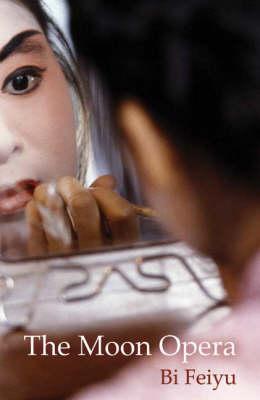In a world where the arts would appear to be in terminal decline, or at least in a depression, it’s somewhat reassuring – though devastating – to discover that it’s not purely a western phenomenon. In Bi Feiyu’s The Moon Opera (2007), it’s clear that over in the Orient, cultural traditions are also on the slide, and notably so in the specialised world of the Peking Opera.
The narration pinpoints the cause, saying, “the decline of Peking Opera began with the decline of man and woman, hand in hand” and blames it on “the degeneration of the sexes.” As for solutions, well there aren’t any offered (save, the regeneration of the sexes). What The Moon Opera does, then, is take this premise and, like all great theatre, reduce the theme to the human level and make the players act it out.
But the stars of this curious performance don’t merely act, because so much more is required of them:
Peking Opera is like no other art form. Whether they are speaking, singing, reading, tumbling, or playing an instrument, though they are touted as ‘artists,’ the performers rely on the strength of their bodies; it is how they make their living. Their bodies are worn out by the time they reach a certain age, and then they are like a desert – pour water on sand, and it disappears without a sizzle.
Luckily there’s a good cast on board for a production of a piece called Chang’e Flies To The Moon, the show that “fortune did not favour”:
The Moon Opera, long a painful memory for the troupe, had been commissioned in 1958 as a political assignment. The troupe had planned to perform it in Beijing a year later as part of the festivities marking the Republic’s tenth anniversary. But before the first performance could be staged, a certain general was unhappy with what he saw at the rehearsal. “Our lands are lovely beyond escription,” he had said. “Why would any of our young maidens want to flee to the moon? It was a simple comment that raised goosebumps on the troupe leader’s flesh. The Moon Opera closed before it had opened.
Then, after the Cultural Revolution, an effort to reprise the opera in 1979 ended when its star, Xiao Yanqiu (“even at nineteen a natural for the role of a heartbroken woman”), threw boiling water in the face of her understudy, subsequently finding herself demoted from performing and, instead, teaching, a move that would remain sore in the mind for years after as “an open wound.”
It’s not until twenty or so years later, that a performance of The Moon Opera is conceived of again, this time under the suggestion of a wealthy cigarette factory owner who, recalling the past, would like to hear Xiao Yanqiu sing once more. And with this first request we begin to see some of the westernisation of the Peking Opera as the money starts to dictate the art, reducing its potency.
Xiao Yanqiu, now forty, is brought back to The Moon Opera to reprise her role as Chang’e, a woman who, on becoming immortal, decides to retreat to the moon. Even after twenty years she’s still an irrational prima donna, and in her years exiled from the stage, has maintained her reputation:
…her temper was justifiably famous. She could seem as formless as water, giving the impression that she would meekly submit to oppression and abuse. But if you were careless enough to actually come up against her, she would turn frosty in the proverbial blink of an eye, and was capable of bringing things to a shattering conclusion through sudden and reckless actions. That is why the dining hall workers at the drama school all said, “We chefs use salad oil whenever we cook, and we avoid Xiao Yanqiu by hook or by crook.”
Xiao Yanqiu’s commitment to the role features excessive dieting to retain the shape she had years before and, towards the end, even more desperate measures. Her growing commitment to the role enhances the observation that “men fight other men, but women spend their whole lives fighting themselves” – and the tragic nature of the performance is revealed.
In addition to being a gripping drama, The Moon Opera takes time to introduce the reader to the world (and theory) of Chinese opera and does so in an engaging way. The translation, for the most part, reads competently although the occasional cliché drops into the prose. But these are soon swept away under the force of myriad water based metaphors – seas, rivers, puddles, tears – that dominate Feiyu’s writing.
For a small novel, The Moon Opera packs a surprising amount of content, and digging beyond the superficial there are wonderful layers of depth to pick away at. It’s a novel that takes on the subjects of identity, gender roles, and cultural decline, amidst the wider themes of jealousy and regret, and, when the curtain drops, is worthy of a standing ovation. Although there are moments when the writing dips, The Moon Opera is quick to recover and rarely hits a wrong note.

3 Replies to “Bi Feiyu: The Moon Opera”